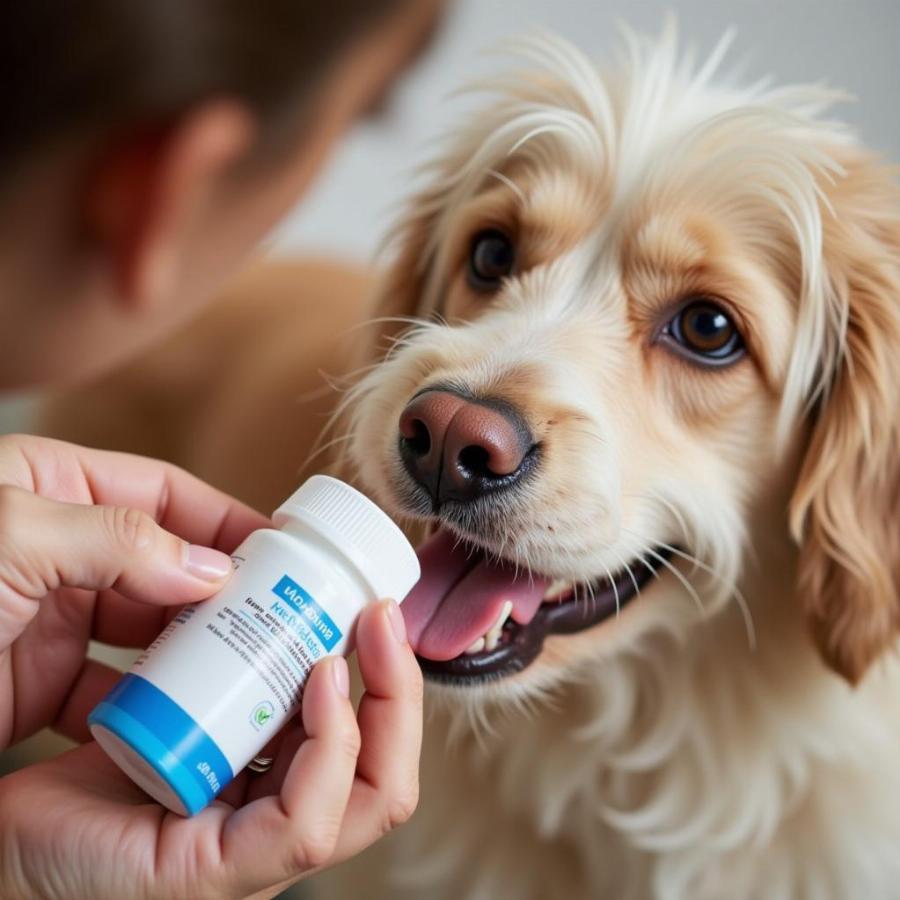Dog bleeding from the bum can be a frightening experience for any pet owner. While it can sometimes be caused by relatively minor issues, it can also be a sign of a more serious underlying health problem. Understanding the potential causes, how a vet diagnoses the problem, and the available treatment options is crucial for ensuring your furry friend receives the best possible care. This article will provide you with a comprehensive overview of what to do if your dog is bleeding from the bum.
Understanding the Causes of Rectal Bleeding in Dogs
There are a number of reasons why a dog might experience rectal bleeding. Some of the more common causes include colitis, anal gland issues, parasites, and even dietary indiscretion. Colitis, an inflammation of the colon, can lead to bloody diarrhea. Anal gland problems, such as impaction or infection, can also cause bleeding around the rectum. Intestinal parasites, like hookworms and whipworms, can irritate the intestinal lining and result in blood in the stool. Finally, something as simple as eating something they shouldn’t, like a chicken bone or a toy, can cause trauma and bleeding. More serious causes can include tumors, polyps, and clotting disorders. It’s important to note that the severity of the bleeding doesn’t always correlate with the severity of the underlying issue.
Diagnosing Rectal Bleeding: What to Expect at the Vet
If you notice your dog bleeding from the bum, it’s vital to schedule a veterinary appointment immediately. The vet will perform a thorough physical exam and gather a detailed history of your dog’s health, including diet, recent activities, and any other symptoms. They might also perform a fecal exam to check for parasites, a rectal exam to assess the area, and blood tests to evaluate overall health and clotting function. Depending on the initial findings, further diagnostic tests, such as X-rays, ultrasound, or even a colonoscopy, might be necessary to determine the exact cause of the bleeding.
Treatment Options for Rectal Bleeding in Dogs
The treatment for rectal bleeding in dogs depends entirely on the underlying cause. For minor issues like dietary indiscretion, a change in diet and perhaps some medication to soothe the digestive tract may be all that’s needed. If parasites are the culprit, deworming medication will be prescribed. For anal gland problems, the vet might express the glands or, in more severe cases, recommend surgery. If the cause is more serious, such as a tumor or polyp, surgery, chemotherapy, or radiation therapy may be necessary.
When is Dog Bum Bleeding an Emergency?
While not all instances of dogs bum bleeding are emergencies, some situations warrant immediate veterinary attention. If the bleeding is profuse, accompanied by vomiting, lethargy, or collapse, it’s crucial to seek emergency care. Similarly, if your dog appears to be in pain, straining to defecate, or has pale gums, immediate veterinary intervention is necessary. These signs can indicate a life-threatening condition requiring urgent treatment.
Home Care and Prevention
While professional veterinary care is essential, there are some things you can do at home to help prevent rectal bleeding in dogs. Feeding a high-quality, balanced diet, ensuring regular exercise, and maintaining good hygiene can significantly reduce the risk of digestive issues. Regular vet checkups and preventative parasite control are also essential for keeping your furry friend healthy.
 Preventative Care for Dog Rectal Health
Preventative Care for Dog Rectal Health
Conclusion
Dog bleeding from the bum can be alarming, but with prompt diagnosis and appropriate treatment, most cases can be managed successfully. By understanding the potential causes, knowing what to expect at the vet, and implementing preventative measures, you can help ensure your dog’s long-term health and well-being. Remember, early detection and intervention are crucial for a positive outcome. If you notice any signs of rectal bleeding in your dog, don’t hesitate to contact your veterinarian.
FAQs about Dog Bleeding From the Bum
- What does bright red blood in dog stool mean? Bright red blood typically indicates bleeding in the lower digestive tract, like the colon or rectum.
- Can stress cause a dog to bleed from the bum? Stress can exacerbate existing digestive issues, which could potentially lead to bleeding, but it’s not a direct cause.
- How can I prevent my dog from getting parasites? Regular preventative deworming medications, as prescribed by your vet, are the most effective way to protect your dog from parasites.
- What should I do if my dog has bloody diarrhea? Contact your veterinarian immediately. Bloody diarrhea can be a sign of a serious health issue.
- Is it normal for a dog to bleed a little after pooping? No, any amount of blood in the stool warrants a veterinary check-up.
- Can dogs noses have scars? While not directly related to bum bleeding, dogs can certainly get scars on their noses, just like anywhere else on their bodies. You can learn more about this in our article on dog dog noses have scars.
- What are some common causes of colitis in dogs? Common causes include food allergies, infections, inflammatory bowel disease, and stress.
Related Articles You Might Find Helpful
You might also find our articles on dogs bum bleeding and dog paw bleeding helpful. If your dog is recovering from surgery and experiencing bleeding, you might also want to read about dog surgical suits. Additionally, if you suspect a burst tumor might be the cause, our article on dog fatty tumor burst could be informative.
Beaut Dogs: Your Trusted Source for Canine Care
Beaut Dogs is your one-stop shop for everything related to dog care. We provide comprehensive and reliable information on a wide range of topics, from breed-specific care to health and nutrition advice. When you need support, please contact us via Email: [email protected] to get detailed and accurate answers from Beaut Dogs. We’re passionate about helping you give your furry friend the best possible care. Visit https://beautdogs.com today to learn more!